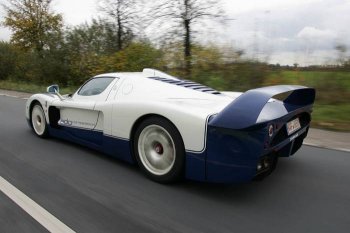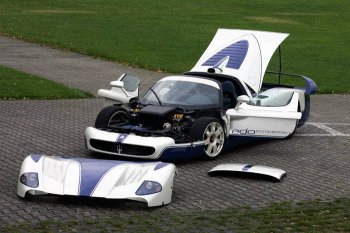|
German
specialist tuning
firm Edo Competition has turned its attention to Maserati
MC12, claiming to have reworked the dramatic supercar's
already powerful engine and dynamic chassis, boosting
power by 70 bhp and raising the top speed to 370 km/h.
The increase in output to around 70 bhp that Edo
Competition's engineers have achieved is done so by
incorporating a new sport catalyser, a new rear exhaust box,
new suction facility, sport air filters and electronic tuning.
The final exhaust boxes are now made out of high-grade steel with
a flap control
system operated by remote maintenance, and
new final pipes in carbon fibre. The uprated braking assembly
now features ceramic composite material brake discs which
are 396 mm at
the front and 360 mm at the rear, as well as the use of
special material brake pads.
The Edo Competition tuned MC12 also features its alloy
wheels finished in the car's overall colour paint at the front and rear;
a new tyre pressure control system which displays the air pressure
and tyre temperature of each individual
wheel; and headlight covers which are fabricated out of Makrolon.
Design modifications centre around a KW tuned chassis which
is now adjustable during course and compression phases: high and
low speed.
The MC12's weight has been reduced by a very healthy 100 kg.
The seats, external mirrors and
the steering wheel are all now lighter while new development
parts have been incorporated, changes going right down to lightweight construction screws
being fitted instead
of standard steel screws. The weight saving extends to lightweight construction
wheel rims made by BBS and fitted with Michelin 255/35 19
tyres at the front and 335/30 20 at the rear (FA: 9 x 19"and RA: 13 x 20").
|
 |
|
The uprated braking assembly now features ceramic
composite material brake discs which are 396 mm at
the front and 360 mm at the rear. |
|
|
 |
|
German
specialist tuning
firm Edo Competition has turned its attention to Maserati
MC12, claiming to have reworked the dramatic supercar's
already powerful engine and dynamic chassis, boosting
power by 70 bhp and raising the top speed to 370 km/h. |
|
|
Other
modifications made by Edo Competition to the MC12 include a fuel
system which features cooling, and a 8 kg sport clutch. Edo Karabegovic,
is the founder the German based Edo Competition Motorsport
GmbH. Following his training while working for a famous
Ferrari workshop in the south of Germany, he went on to work with different
racing teams all around the world. He soon started to
perfect Ferrari and Porsche models technically and visually,
and to him in this task, the experiences from the racing sports were very
helpful. For the last seven year Christian Heitgreß has been the foreman
and director of the team.
Backing their reputation with results, in 1998, 1999 and 2000
Edo Competition won the
Team Ferrari Porsche Challenge. In 2001, after the end of
the racing season, the team built a spectacular simulation
of a Porsche 996 GT3-R designed for street use. This project was
really the beginning of the firm's now established direction
of crafting individual dream
cars out of standard vehicles, which has now resulted in the
Edo Competition MC12.
Edo
Competition Maserati MC12 - Technical Data: Eengine V12 cylinder;
Max Power ca. 700 bhp(514 kW) at 8,200 rpm; Max. Torque ca. 715 Nm
at 5,800 rpm; Max. Speed > 370 km/h;
0 – 100 km/h ca. 3,5s;
0 – 200 km/h ca. 9,5s;
0 – 300 km/h ca. 22,0s
|
|
|
|